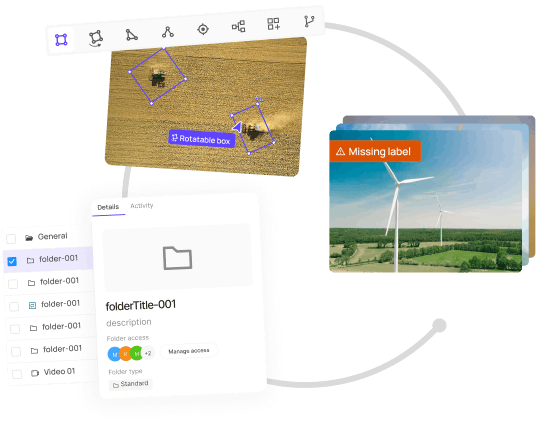Classification
Encord Computer Vision Glossary
Classification is a fundamental task in machine learning that involves assigning a category or label to a given input data point based on its characteristics. In other words, classification is a supervised learning method that allows machines to learn how to classify new instances into a pre-defined set of categories based on the features present in the data.

Image showing object classification. Source: Author labeled using Encord
Importance of Classification
Classification plays a crucial role in various domains, including data analysis, pattern recognition, and predictive modeling. By organizing data into distinct classes, classification algorithms enable accurate predictions and identify meaningful patterns. This technique aids in automating tasks, reducing human errors, and enhancing efficiency. Moreover, classification allows businesses to segment their target audience, personalize marketing strategies, and optimize resource allocation. In healthcare, classification helps diagnose diseases based on symptoms and medical records. It also supports fraud detection, spam filtering, sentiment analysis, and many other applications, making classification an indispensable tool in modern machine learning.

Classification Algorithms
A plethora of classification algorithms exists, each with its strengths and suitable use cases. Popular algorithms include logistic regression, decision trees, support vector machines (SVM), random forests, and neural networks. These algorithms employ various mathematical and statistical techniques to analyze and classify data accurately. They learn from labeled training data to build predictive models and make predictions on unseen data. Some algorithms are more interpretable, allowing for insights into the decision-making process, while others prioritize accuracy and handle complex datasets. Selecting the appropriate algorithm depends on the nature of the problem, dataset characteristics, and desired outcomes.
Applications of Classification
Classification finds extensive applications across diverse industries. In finance, it aids in credit scoring and fraud detection, minimizing financial risks. E-commerce platforms utilize classification for product recommendation systems, enhancing user experience and driving sales. Classification also enables sentiment analysis in social media monitoring, providing valuable insights into customer opinions. In the healthcare domain, it helps predict disease outcomes and identify high-risk patients for proactive interventions. Moreover, classification supports image and speech recognition, text classification, and document categorization, streamlining information retrieval and organization.
Conclusion
Classification is a vital technique in machine learning, enabling accurate categorization of data into classes. Its applications span numerous industries, empowering businesses to make data-driven decisions and extract valuable insights. By harnessing classification algorithms, organizations can enhance efficiency, automate processes, and gain a competitive edge in today's data-driven landscape.